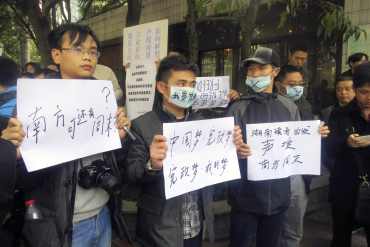 | « Back to article | Print this article |
 A rare protest by journalists of a state-run Chinese weekly against official interference entered the second day on Tuesday amid tacit support from other media outlets, notwithstanding the ruling Communist Party of China's assertion that it had an "absolute and unshakable" control over them.
A rare protest by journalists of a state-run Chinese weekly against official interference entered the second day on Tuesday amid tacit support from other media outlets, notwithstanding the ruling Communist Party of China's assertion that it had an "absolute and unshakable" control over them.Reports from Guangzhou said protests continued for the second day on Monday by the journalists and police intervened to stop scuffles between scribes and a small group of government supporters who appeared on the scene with Mao's portraits.
But the most decisive response came from the CPC, which in a memo circulated to various media units firmly stated that the official media would remain in its complete control.
"The party has absolute control of China's media. This basic principle is unshakable," the memo issued by the publicity department of the Communist Party's central committee to party chiefs and media officials said.
Referring to Monday's protests by journalists demanding freedom from interference of local party officials, the memo said, "The incident has nothing to do with Guangdong province's propaganda chief, comrade Tuo Zhen," who was accused of having rewritten a critical editorial.
The journalists blamed Tuo for altering a critical editorial written by the editors in the New Year edition adding pro-party and government content.
Instead, the party memo accused "foreign forces" of being behind the incident. "Hostile foreign forces had interfered in the Southern Weekend incident," the Hong Kong-based South China Morning Post quoted the memo as saying.
The memo requires officials to continue to prevent editors and journalists from expressing online support for Southern Weekend. It also asked newspapers to print an editorial published by the state-run newspaper the Global Times on Tuesday, which ruled out freedom of press.
It claimed that former employees of the Southern Weekly and activists, including the US-settled blind Chinese rights activists Chen Guangcheng, were "among those who avidly promote the issue online." "Their campaign, ostensibly aiming at specific officials, actually targets China's entire media system," it said.
Image: Demonstrators hold banners outside the headquarters of Southern Weekly newspaper in Guangzhou, Guangdong province | Photograph: Oleg Popov/Reuters